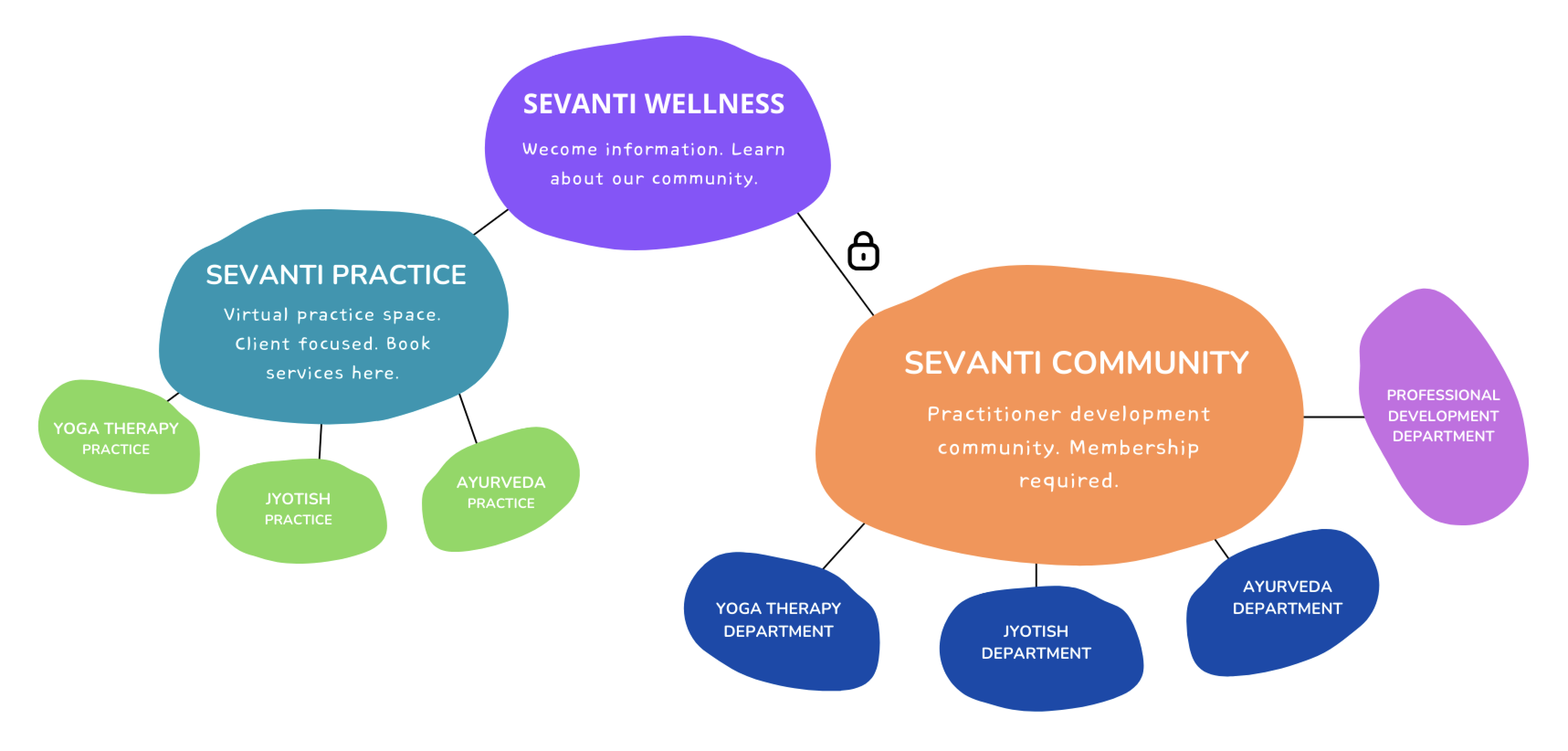Signature at Bottom of Page Required for Membership
Team Member Agreement
Our Team Member Agreement outlines essential qualifications and expectations that help us maintain best practices,
credibility, and position as a leading wellness practice provider.
Sevanti Wellness Vision
Sevanti was founded in 2001 to offer wellness, education, and sacred travel opportunities. It is our hope that we all awaken to our most precious gift: a loving self-compassion steeped in self-knowledge (svavidya). There is no greater knowledge or source of happiness and health than a compassionate knowing of who we are in this life.
Sevanti Wellness was launched in early 2025 as a Practitioner Development Community that supports practitioners of Ayurveda, Yoga Therapy, and Jyotish. We do this by providing a highly experienced leadership team and our acting philosophy known as the Three Pillars of Team Practice: (1) practitioner community support and team practice, (2) clinical residency programs, and (3) professional development and coaching programs. We also offer virtual tools such as prerecorded and live programming, booking platforms, Zoom video meetings, and Zoom Team Chat DM channels to connect you to your professional community peers and clients. These pillars are essential to practice success. This novel community concept is organized into practicing departments that offer the tools practitioners need to develop successful practices.
Practitioner Membership Community
Sevanti Wellness is a membership-based practitioner support community. Sevanti Wellness requires a flat monthly membership fee of $200. Membership grants access to support from our peer practitioner community, support from our leadership team of faculty and directors, professional development workshops, mentorships, a booking platform, and automated communications with lead clients.
Sevanti Wellness Will Provide the Following
Community Solutions
Sevanti Wellness maintains three practice departments of Ayurveda, Jyotish, and Yoga Therapy. The purpose of the each department is to create a community of practice peers with oversight by highly experienced faculty. Departments also oversee two monthly virtual Kula Gatherings, limited free content and webinars, an optional residency program. Each department is administered by a director and overseen by two to five faculty members with decades of experience teaching and practice in their field. Departments are the center of our community team practice.
Practicing alone can be disempowering and alienating. With virtual practice, community is just a Zoom meeting away. Join us and immerse yourself in professional, social, academic, and clinical teamwork. Learn from and share with your peers. Set up a referral network that reciprocates. Enroll in our mentorship program. Practicing in a clinical community nourishes your gifts, like water and sunshine, to a garden.
Practitioner Community Support
All members of our practitioner community (faculty, directors, and practitioner members) agree to support one another. Gain access to our wide range of clinical and academic professionals who can provide advice and support on a limitless range of issues impacting your practice.
– Practitioners within each practice department form a community support network.
– Post questions on your department’s Zoom Team Chat channel. Give and receive feedback in the spirit of community support.
– Learn from and share with your department team.
– Get clinical feedback on challenging cases. Improve your case management skills.
– Grow your practice by offering workshops to showcase your expertise.
Kula Gatherings
Twice per month. 1st & 3rd weeks. | Clinical in focus. Each practice department will hold its own virtual meetings every two to four weeks. Learn clinical skills from and share with your peers. Present challenging case reports for feedback. Use this time to share clinical methods, present findings from your work, share new practice methods, and share resources relevant to each discipline’s unique practice system.
Sangha Gatherings
Once a month. | Social gatherings. SW will offer casual virtual meetings, open to practice members across all three departments, to meet and greet, learn from each other’s lives, practices and specialties, and deepen social connections. These meetings are the perfect space to ask questions and brainstorm new ideas. Whether concerning your practice, managing clients, workshops, or anything else relevant to the Sevanti sangha, these monthly virtual calls are the backbone of our community of practitioners.
Reciprocated Referrals
Receive and send referrals from practice members across all disciplines at Sevanti Wellness. Create your own network of SW team member referrals that will reciprocate with their referrals to you. If you are an Ayurveda Counselor, send your client to one of our Ayurveda Nutritionists to create a customized meal plan. If you are a Vedic Astrologer and you sense that your client needs physical support for a recent injury, send them to one of our Yoga Therapists. If a client’s health is not responding to standard care, send them to a Jyotishi. The issue may be in their chart. Highlight your practice specialty topics on your Practitioner Profile page, and others will refer clients to you.
Residency Programs | Advanced Clinical Solutions
Sevanti Wellness is proud to offer department-based residency programs to its community members. Residency programs focus on advanced clinical training within the boundaries of their department tradition with some interdepartmental training. Residency training allows practitioners to aim for practice mastery built upon exposure to advanced clinical skill sets and the development of specialty training. We strive to create a healthy residency experience with enthusiastic residents who are clear about their long-term career goals and pleased with the quality of their training. The goal is to develop a master level of clinical competency within their scope of practice.
Residency Programs Includes
– Each department offers its own independent residency program and will vary in structure and content.
– Additional residency fees required. Check with your department for required fees.
– Advanced clinical training rarely offered in most school programs
– Didactic clinical courses from experienced instructors
– National certification exam prep courses
– Continued education credits
– To enroll, community members must upgrade their community membership to Residency Program status.
– Residencies are an opportunity to dig deeper into your practice skills or to develop a specialty practice.
– Residents can choose to dedicate their residency to one faculty for specialization or cycle through different faculty for set periods, allowing exposure to various skill sets and specialties.
– Residents can choose a specialty residency and focus on one specialty from the beginning or start with a broader overview before specializing later.
– Residents must select a primary faculty, but they can have several from the same department or from across departments for interdisciplinary studies.
– Faculty closely monitor and guide residents’ clinical decisions and case management.
– Residents will participate in lectures, workshops, and other educational sessions to deepen their knowledge. Residents may be asked by their faculty to give talks or seminars to other department residents and/or the larger Sevanti Wellness members. Other departments may request residents to share their knowledge with their department members and residents.
National Exam Prep Courses
Sevanti Wellness team members are not required to be recognized by national trade associations such as the National Ayurvedic Medical Association (NAMA) or the International Association of Yoga Therapists (IAYT). We aim to support graduates immediately upon graduation before they potentially drop out of practice. The period between graduation and NAMA/IAYT certification is critical. Though we do not require it, NAMA and IAYT recognition is a powerful step in your professional development, and we suggest you consider professional membership. NAMA and IAYT have national certification exams. Preparation for these exams can be a bit intimidating without guidance. Sevanti Wellness will offer prep courses for both exams to support you on that journey.
Continued Education Credits
If you are a professional NAMA or IAYT member, you must submit continued education hours to maintain your membership. NAMA’s Professional Ayurvedic Continuing Education (PACE) program requires professional members to complete 30 credits every two years. IAYT requires at least 24 hours (24 CEs) of IAYT-approved continuing education every three years. Your attendance and teaching time at Sevanti Wellness may be accepted for CEU credits.
Professional Development Solutions
Sevanti Wellness maintains the Department of Professional Development (DPD), which is separate from the three practice departments of Ayurveda, Jyotish, and Yoga Therapy. The purpose of the DPD is to oversee the Professional Development Program, practitioner development programming, and coaching programs. It is administered by a director and three faculty members with decades of experience in teaching practitioners how to build private and group practices. We want to empower your practice as a revenue source. Our Professional Development Program offers workshops, prerecorded and live programming from practice management instructors, downloadable PDFs, and continued education to help you rise and expand your business skillset.
Professional Development Program
The Professional Development Program is an optional advancement program focused on enriching our community members with advanced and holistic business management skills and personal coaching. Limited content will be offered at no additional cost to our community members. Enrollment in the Professional Development Program grants access to more advanced content and personal feedback on your business practice needs.
Faculty will offer free workshops on professional development to community members on the following schedule:
1. One monthly workshop: 60-90 minutes
2. One quarterly workshop: 3-4 hours
3. One biannual training: online retreat
For those wanting more advanced training in holistic wellness business management, we encourage you to enroll in the Professional Development Program. This program will be offered in a three-tiered format.
Tier 1: Primary Training – prerecorded modules, monthly group calls
Tier 2: Advanced Training – less recorded content, more live content, facilitated group coaching
Tier 3: Executive Training – one-on-one personalized executive coaching
Personal Coaching
The Professional Development Program includes personal coaching as part of its curriculum. Coaching enables our practitioner members to receive critical support and guidance from an experienced life and business coach. For a higher standard of guidance, personal coaching is offered via one-on-one and group coaching. Faculty will establish best practices and policies for professional development and personal coaching. Faculty are also available for personal and group coaching.
Practitioner Workshops
Practitioners are encouraged to offer free workshops to other team members. Department faculty must approve the workshops and are provided at no cost. The workshops aim to educate each other and improve teaching skills. If you are in an educational mentorship, please speak with your mentor about offering a workshop.
Continued Education Credits
If you are a professional NAMA or IAYT member, you must submit continued education hours to maintain your membership. NAMA’s Professional Ayurvedic Continuing Education (PACE) program requires professional members to complete 30 credits every two years. IAYT requires at least 24 hours (24 CEs) of IAYT-approved continuing education every three years. Your attendance and teaching time at Sevanti Wellness may be accepted for CEU credits.
Virtual Platform Solutions
The SW Virtual Tools enable our Team Practitioners to access new client leads around the worldwide from the comfort of home. Our virtual tools include access to our client booking platform, automated notifications, encrypted data storage, and intake forms. All are included in the flat monthly membership fee. Control your availability and rates. Client payments are deposited directly into your bank account. DM team members and mentors on our Team Chat channel. Each department (Ayurveda Counseling, Yoga Therapy, and Vedic Astrology) will have their own Team Chat channel and communications. Check with the Department Director for more details.
1. Video library access: members have access to live webinars and course recordings.
2. Document library – members can upload and share their articles for publication in the library
3. Team Chat channel – each department has a group and individual communications channel.
4. Booking platform included – book clients from your profile page on the SW website and/or your website.
5. Control your rates and hours of availability.
6. Payment processing requires clients to prepay for your services upon booking.
7. Booking links and widgets – can easily be plugged into your existing website.
8. Zoom links are automatically embedded in your client email notifications upon booking.
9. Clinical forms – optional client intake and clinical forms to give your practice additional structure.
Join our Group Sevanti Practice
Sevanti Community members are invited to join our virtual practice hosted on the Sevanti Practice website. But we are more than just a website. Behind the tech are leaders in their fields who are present and able to support your practice. Below are just some of the benefits of practicing with us. Members are not obligated to practice at Sevanti Practice. Some practitioners will opt to use our booking platform, while others already have their own. We’re happy to link you to your website. Let us know how you’d like to be part of our practice.
1. Complete autonomy in managing bookings, setting your hours and prices to be fully accessible to your community.
2. Keep 100% of your earnings
3. Book anywhere – membership utilizes a videoconference connection to book sessions wherever your community is.
4. Keep your branding and intellectual property and benefit from Sevanti Wellness marketing. We don’t believe in exclusive non-compete relationships.
5. Marketing support for your practice via newsletter and social media outlets.
6. An individual booking account to immediately get your virtual practice up and running, which includes:
– Scheduling software: control your calendar, when and where you take bookings
– Payment processing: earnings are deposited directly into your bank account
– Client Management: profiles for clients allow you to keep track of relationships
– An individual booking link and calendar widget can be easily plugged into your existing website.
7. Selection of client intake and other clinical forms available to give your practice additional structure.
8. Professional mentoring and support:
– Individual one-to-one clinical support for your practice (via individual appointments and regularly scheduled open office hours)
– Opportunities to grow your practice by offering group workshops showcasing your expertise
– A community of like-minded practitioners to elevate and grow your practice and revenue
Admissions Requirements
Admission Requirements
Application Requirements
Every member must meet the following essential qualifications.
a. Be over 21 years of age
b. Provide proof of liability insurance if opting to use our booking platform
c. Pay monthly membership dues of $200 per month
d. Abide by our code of professional behavior and conduct
e. Take pride in one’s practice and oneself
f. Virtual appointments should not be conducted while driving, cooking, or other activities
g. Maintain client privacy – no one other than the practitioner is physically present (unless the client has expressed consent)
Member Must Provide the Following
a. Zoom Pro Plan — All members must have a Zoom Pro account ($14/mo). Since basic Zoom accounts have a meeting limit of 40 minutes, we require all our practitioners to have (or purchase) a Zoom Pro plan account.
If you choose to use our Acuity online booking platform, you will be asked to provide the following:
b. During onboarding, you will asked to link your Zoom account with Acuity Scheduling.
c. Stripe, Square, and/or PayPal payment processing—During onboarding, you will be asked to link your payment processing account with Acuity Scheduling.
d. Liability Insurance Requirements — To use our booking platform, all practitioners must submit proof of liability insurance and maintain their policy throughout the term of their membership with us. Sevanti Wellness must be added as an additional insured. Alternative Balance offers affordable liability insurance coverage for Ayurveda Counselors, Yoga Therapists, and Vedic Astrologers. See the webpage for helpful support.
e. Your practitioner profile page details: headshot, your bio, specialties/expertise, and client focus
Department Qualifications
Ayurvedic Counseling — Three ways to qualify for practice as an Ayurvedic Counselor:
– Hold certification from a school of Ayurveda of good standing within the professional community and pass the interview process with the department director and faculty. Or,
– Qualify as a Certified Ayurvedic Health Counselor (CAHC) or above with the National Ayurvedic Medical Association (NAMA). Or,
– Qualify as a Registered Ayurvedic Health Counselor (RAHC) with the Association of Ayurvedic Professionals of North America (AAPNA).
Yoga Therapy — Three ways to qualify for practice as a Yoga Therapist:
– Hold certification from a school of Yoga Therapy of good standing within the professional community and pass the interview process with the department director and faculty. Or,
– Qualify as a Certified Yoga Therapist (C-IAYT) with the International Association of Yoga Therapists (IAYT). Or,
– Optionally qualify as a Certified Ayurvedic Yoga Therapist (CAYT) with the National Ayurvedic Medical Association (NAMA)
Jyotish/Vedic Astrology — Three ways to qualify for practice as a Vedic Astrologer:
– Hold certification from a school of Vedic Astrology of good standing within the professional community and pass the interview process with the department director and faculty. Or,
– Qualify as a Jyotish Visharada with the Council of Vedic Astrology (CVA). Or,
– Qualify as a Registered Vedic Astrology Consultant (RVAC) with the Association of Ayurvedic Professionals of North America (AAPNA).
Community Best Practices
All Members Agree to the Following:
Code of Professional Behavior
Sevanti Wellness prides itself on providing professional, high-quality wellness. Our practitioners take pride in their practice as well as themselves. Virtual appointments should not be conducted while driving, cooking, walking the dog, or any other activity. The environments where practitioners see clients are clean, and sessions overall, whether online or in-person, are safe, nonjudgmental, and free of all distractions. It is essential to dress appropriately to show respect to the client, the practice, and oneself.
Harassment Against Members of Protected Class
We do not permit directors, faculty, practitioners, clients, or others in the community to harass any other person because of age, gender (including pregnancy), race, ethnicity, culture, national origin, religion, sexual orientation, disability, socioeconomic status, genetic information, or any other basis proscribed by law.
Harassment is unwelcome verbal or non-verbal conduct, based upon a person’s protected characteristic, that (i) denigrates or shows hostility or aversion toward the person because of the characteristic and which affects their employment opportunities or benefits; (ii) has the purpose or effect of unreasonably interfering with their work performance; (iii) enduring the offensive conduct becomes a condition of continued employment; or (iv) has the purpose or effect of creating a work environment that a reasonable person would consider intimidating, hostile, or abusive.
Harassment includes epithets, slurs, name calling, negative stereotyping, insults, intimidation, ridicule, threatening, intimidating or hostile acts, denigrating jokes, and display in the workplace of written or graphic material that denigrates or shows hostility or aversion toward an individual or group based on their protected characteristic. Petty slights, annoyances, and isolated minor incidents may not rise to the level of harassment.
Sexual Harassment
We do not tolerate sexual harassment in our community. Sexual harassment refers to any unwelcome sexual attention, sexual advances, requests for sexual favors, and other verbal, visual, or physical conduct of a sexual nature when:
(a) submission to such conduct is made either explicitly or implicitly a term or condition of an individual’s employment;
(b) submission to or rejection of such conduct by an individual is used as the basis for employment decisions affecting such individual;
(c) such conduct has the purpose or effect of unreasonably interfering with an individual’s work performance; or
(d) such conduct has the purpose or effect of creating an intimidating, hostile, or offensive working environment.
Examples of sexual harassment include unwanted and unnecessary physical contact; offensive remarks (including unwelcome comments about appearance); obscene jokes or other inappropriate use of sexually offensive language; the display in the studio of sexually suggestive objects or pictures; and unwelcome sexual advances by teachers, students, customers, clients, or other visitors to a studio. Non-physical gesture, behavior, unnecessary physical contact, verbal suggestion, or innuendo may constitute sexual harassment.
Verbal harassment:
• Unwanted sexual teasing, stories, jokes, remarks, or questions • Sexual comments, stories or innuendo
• Turning work discussions to sexual topics
• Asking about sexual fantasies, preferences, or history
• Asking personal questions about social or sexual life
• Sexual comments about a person’s clothing, anatomy, or looks
• Telling lies or spreading rumors about a person’s personal sex life.
• Referring to an individual as a doll, babe, sweetheart, honey, or similar term • Repeatedly asking a person out on dates who is not interested
• Unwanted letters, telephone calls, or sending materials of a sexual nature • Stalking on social media
• Unwanted pressure for sexual favors
Non-verbal Harassment:
• Blocking a person’s path or following
• Giving unwelcome personal gifts
• Displaying sexually suggestive materials
• Making sexual gestures with hands or through body movements • Unwanted sexual looks or gestures
Physical Harassment:
• Hugging, kissing, patting, or stroking
• Touching or rubbing oneself sexually around another person
• Unwanted deliberate touching, leaning over, cornering, or pinching
• Giving an un-wanted massage
• Sexually oriented asana adjustments or touch
• Promising enlightenment or special teachings or status in exchange for sexual favors • Actual or attempted rape or sexual assault
Sexual Misconduct
We prohibit sexual misconduct in our community. Sexual misconduct is any unsolicited and unwelcome sexual advance including requests for sexual favors, sexual touching, and verbal, visual, or physical conduct that creates a sexually hostile environment.
Sexual misconduct also arises if a practitioner engages in conduct that has the purpose or result of requiring a client to submit to such conduct to obtain any benefit or privilege relating to the study or teaching of yoga, Ayurveda, or Jyotish.
While it is not possible to list all the circumstances that may constitute sexual misconduct, the following are examples of misconduct:
- Sexual advances whether they involve physical touching or not;
- Sexual epithets, jokes, written or verbal references to sexual conduct, gossip regarding one’s sex life,comments on an individual’s body, sexual activity, deficiencies, or prowess;
- Displaying sexually suggestive objects, pictures, cartoons;
- Unwelcome leering, whistling, brushing against the body, sexual gestures, suggestive or insulting comments
- Comments or conjecture about a person’s sexual orientation or gender identity;
- Inquiries into one’s sexual activities;
- Sexually oriented asana adjustments or touch; and
- Discussion of one’s sexual activities.
Romantic Relationships within the Community
Practitioners shall avoid personal or sexual relationships with clients that may impair their professional judgment or compromise the integrity of their services. If a relationship begins to develop, the practitioner should bring it to the attention of an administrator.
Practitioners are committed to maintaining impeccable standards of professional integrity and to promoting the physical, emotional, and spiritual well-being of their clients. Practitioners recognize the inherent imbalance of power in the practitioner-client relationship and recognize that romantic relationships with clients have the potential of exploiting the trust of clients, creating dependent relationships, and compromising the integrity of the practitioner.
Practitioners should avoid acting on, responding to, or allowing sexual contact or romantic attraction with a client even if the client initiates the relationship. Practitioners should ensure that their relationships with clients are always professional, and not open to misunderstanding or misinterpretation.
However, if a romantic attraction does begin to develop with a client, practitioners should seek guidance from an administrator before acting on the attraction. The administrator will then decide how Sevanti Wellness wishes to handle the relationship. For example, it may bless the relationship, but establish boundaries to prevent conflicts of interest and other problems. It may also decide that either the practitioner or client should leave the community.
If a practitioner has a pre-existing relationship with a client that did not arise from the practitioner-client relationship, it should be brought to the attention of an administrator so that it can guide the couple in maintaining high ethical standards.
Right to Cancel Membership
Members are expected to follow the above best practices and behave in an orderly and socially acceptable manner. Sevanti Wellness reserves the right to remove any member who acts in a manner that is unreasonable or disruptive to the well-being of other members, staff directors, faculty, guest faculty, or clients booked through our booking platform.

Your Signature is Required for Membership
Sevanti Wellness requires all applicants to adhere to the agreement above to join our community. Please read through it to understand the structure of our community and what it has to offer you. If you have questions, please reach out to us. We hope you will contribute wholeheartedly to the spirit of our community and the practice development of all members. We look forward to practicing with you!
Please complete the form and submit:





















 Sevanti Practice
Sevanti Practice